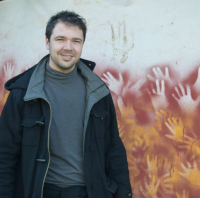
Crisis are moments of disruption. They are the key moments in which subjectivity and objectivity intersect. Krisis, the Ancient Greek noun, is derived from krinó/krinein - a verb which means to separate, to choose, to decide or to judge. Crisis thus designated the existence of a situation or moment that showed a restriction of alternatives and called for a decision. The use of crisis in its “natural scientific” form dates back to its medical signification which prevailed since 5th century BC. Crisis denoted a turning point of a disease, a phase of an illness, in which it is decided whether or not the organism's self-healing powers are sufficient for recovery. The illness, appears objective; as empirical deviations from the normal, healthy state of the organism. The patient experiences his powerlessness vis-a-vis the objectivity of the illness, a subject condemned to passivity and temporarily deprived of the possibility of being a subject in full possession of his powers. Crises are therefore associated with the idea of an objective force that deprives a subject of one part of his normal sovereignty. (Habermas, 1975) We would not speak of a crisis however, if death were certain. Crisis is thus never only an objective, external process. In its medical form – like in its theological - crisis designates a phase calling for an irrevocable decision. (Roitman, 2011)
Crises are moments of exception, the require exceptional measures. This covid19 pandemic is an extreme example. The attempt to control the crisis requires to stop the normal functioning of society, measures interrupted all normal social interaction from young to old , from closing schools to interdicting funeral rituals, they stopped and changed large parts of the economy, closing commerce and obliging people to work from home, the foreclosed most of public life and democracy, emptying the streets, imposing states of emergency, forbidding strikes and postponing elections. It is very important to keep in mind that states of exception and crisis are first and foremost political processes – even when, or even just because, they apparently disrupt “normal” politics.
In recent public interventions, Giorgio Agamben has warned for this state of exception, which sacrifices not only our freedom in order to defend it – like did the war on terrorism. According to Agamben, life is reduced to its purely biological condition of bare life, losing all its political and human dimensions. To control the effects of the virus, all other normal life is suspended. Inspired by Foucault, Agamben claims this state of exception is the confirmation of a historical trend that totally transformed modern politics into a bio-politics in which biological life is the ultimate stake. Foucault’s concept of Bio-power referred to scientific and expert-based policies which were directed to the biological health of people. The Belgian paper De Standaard recently featured a debate between several social scientists and philosophers around the usefulness and validity of the concept of bio-power to address the contemporary pandemic. Bert de Munck started the debate, arguing in an opinion piece for caution towards biopower and the danger of “science” controlling our life and freedom. He pointed towards how decisions are taken upon scientific data; and scientific data control our current life in unimagined way, while there is even no scientific consensus about the data regarding the impact of covid19 among scientists. He therefore called for a political and moral debate about the measures. Blancke, Loobuyck and Boudry reacted with an opinion article in which they argued that “playtime” is over. They claim that informed policies are not the result of bio-politics but are based upon the principles of democracy and a critical dialogue between policymakers and scientists. They claim that the reliance on biopolitics is just an easy trick applicable upon any political debate. They ask if Munck would apply the same principle to the political question of climate change – calling climate policies a “climate-dictatorship”, and conclude that the analysis of Muck only undermines the much-needed trust in democracy and science itself. In the same way Agamben was and is fiercely criticized for bringing up these issues to public debate in Italy. His ideas - effectively minimizing the numbers when he stated that so far according to the official numbers only one in every 1000 Italians would be infected (now it is 1/500) - would create doubts into the scientific measures put in place to control the pandemic and thereby would endanger tens of thousands more victims.
Was Munck right to warn about the lack of reliable data and deficient statistics? The statistics are certainly debatable. There are various arguments to question the actual impacts and possible trends of the covid19 pandemic in every direction. The public data in the media rely on confirmed deaths and confirmed cases, based upon tests – mostly rt-PCR tests, which search for corona virus rna in swabs that collect saliva and mucous in nose and throat. Due to margins of errors in those tests, they are often repeated twice or trice for diagnosis. In case of death and a positive test, it is not easy to determine if death was caused by the disease or by underlying conditions. Due to the limited number of tests, different testing policies and the fact that the tested people do not represent a random sample of society, the actual outcomes of those tests don’t say much about the prevalence nor evolution of the corona-virus in our society, nor about the actual numbers of deaths due to covid19 in our society, nor about the actual risk of death due to covid19. Other data point to different directions: Iceland is the only country which organizes random tests, and their data show a death-rate of 0,5% of the infected, which is consistent to WHO predictions, and is 3-5 times the usual flu-statistic. Belgian funeral agencies reported no increase in deaths during the month of March, despite a spike in the covid19-statistics. Also Portugal saw its monthly death-toll drop by 900 in comparison with an average March-month, although there was a rising trend at the end of the month. Spanish and Italian data on average death-rates in the society at large, on the other hand, showed considerable underreporting of covi19-induced deaths. They showed a significant increase of deaths of affected areas which was 3 to 4 times higher than those accounted for in the official statistics. Do the emergency-measures have an impact of the death-rates? Most probably! But it is nearly impossible to calculate how much and what effects without reliable data. We will probably have no reliable data until this crisis is over, and policymakers can take no risks. Prudence is a good advice in situations of high risks, but prudence should not be an obstacle for thinking and critique… particularly in moments of crisis. With capitalism on the brinks of collapse and its contradictions made bare to everyone - with civil, social and political revoked - we should never just trust technocratic policies. Crisis call for politicization and alternatives.
Personally I don’t buy the concept of bio-politics advanced by Agamben and Munck. It reflects a certain essentialization and reification of power and the state – as if these would be single entities or defuse phenomena – as Foucault would have argued. This approach to politics was only possible because of the very specific, inter-class appearance of the state which had developed in the West during the post-war period. During this period, the state – and science - could gain the appearance of a class-independent bureaucratic institution that spread its ever-bigger control over all spheres of life up to the biological level of interaction between the social and the natural. With the collapse of the welfare regimes and the emergence of neoliberalism, this kind of neutral bureaucratic state has disappeared, and with it probably the usefulness of the concept of bio-politics.
As a socialist and a Marxist I believe that the best approach towards our contemporary debate about crisis and science is one of critique of the political economy. Science is never neutral. And just like the state, "the truth" and "science" are historical products; they are part of a prevailing hegemony and the fruit of class interests. Much beyond the rational critique and method the positivists adhere to, scientific truth is subject to political and social pressures and constantly changes. What may be tomorrow’s truth, is not necessarily the truth today. Truth and science are therefore political, or as Marx put it; the truth is the fruit of Man’s historical praxis. This principle does not mean that all elements of the contemporary bourgeois scientific framework are considered false and should be thrown into the dust bin, much like a thought-exercise on socialism not necessarily eliminates all concrete material elements of capitalist production methods. Probably "bourgeois measurability" and "standardization" – products of 18th and 19th century capitalism will remain very useful in socialist societies. Today's capitalist science is, moreover, still a form of hybrid, despite the neoliberal revolution: It still reflects a number of elements of socialist science, much of which are the result of public research by states where the working class has or had relative strong power positions. But in global terms, science is not class-objective: as after all, most of the research and science, both in public and private sector, are guided by principles of capitalist political economy and ideology, in terms of methods, funding, priorities and frameworks.

Jonas Van Vossole is a PhD candidate in the doctoral program “Democracy in the XXI Century” at the Centre for Social Studies at the University of Coimbra. He is graduated in economy and political science and an associate researcher of ECOSOC - Oficina de Ecologia e Sociedade